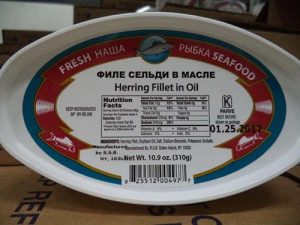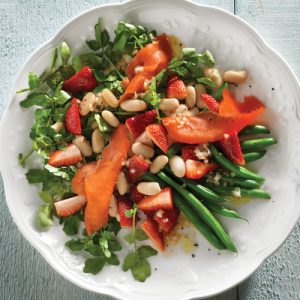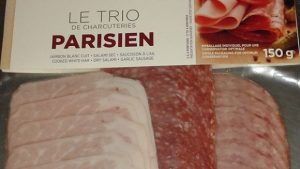Internalin A is an essential virulence gene involved in the uptake of the foodborne pathogen Listeria monocytogenes into host cells. It is intact in clinical strains and often truncated due to Premature Stop Codons (PMSCs) in isolates from processed foods and processing facilities. Less information is known about environmental isolates.
 We sequenced the inlA alleles and did Multi Locus Variable Number Tandem Repeat Analysis (MLVA) on 112 L. monocytogenes isolates from a 3-year period from naturally contaminated watersheds near a leafy green growing area in Central California. The collection contained 14 serotype 1/2a, 12 serotype 1/2b, and 86 serotype 4b strains. Twenty-seven different inlA alleles were found. Twenty-three of the alleles are predicted to encode intact copies of InlA, while three contain PMSCs. Another allele has a 9-nucleotide deletion, previously described for a clinical strain, indicating that it is still functional. Intact inlA genes were found in 101 isolates, and 8 isolates contained the allele predicted to contain the 3-amino acid deletion. Both allele types were found throughout the 3-year sampling period. Three strains contained inlA alleles with PMSCs, and these were found only during the first 3 months of the study. SNP analysis of the intact alleles indicated clustering of alleles based on serotype and lineage with serotypes 1/2b and 4b (lineage I strains) clustering together, and serotype 1/2a (lineage II strains) clustering separately. The combination of serotype, MLVA types, and inlA allele types indicate that the 112 isolates reflect at least 49 different strains of L. monocytogenes. The finding that 90% of environmental L. monocytogenes isolates contain intact inlA alleles varies significantly from isolates found in processing plants.
We sequenced the inlA alleles and did Multi Locus Variable Number Tandem Repeat Analysis (MLVA) on 112 L. monocytogenes isolates from a 3-year period from naturally contaminated watersheds near a leafy green growing area in Central California. The collection contained 14 serotype 1/2a, 12 serotype 1/2b, and 86 serotype 4b strains. Twenty-seven different inlA alleles were found. Twenty-three of the alleles are predicted to encode intact copies of InlA, while three contain PMSCs. Another allele has a 9-nucleotide deletion, previously described for a clinical strain, indicating that it is still functional. Intact inlA genes were found in 101 isolates, and 8 isolates contained the allele predicted to contain the 3-amino acid deletion. Both allele types were found throughout the 3-year sampling period. Three strains contained inlA alleles with PMSCs, and these were found only during the first 3 months of the study. SNP analysis of the intact alleles indicated clustering of alleles based on serotype and lineage with serotypes 1/2b and 4b (lineage I strains) clustering together, and serotype 1/2a (lineage II strains) clustering separately. The combination of serotype, MLVA types, and inlA allele types indicate that the 112 isolates reflect at least 49 different strains of L. monocytogenes. The finding that 90% of environmental L. monocytogenes isolates contain intact inlA alleles varies significantly from isolates found in processing plants.
This information is important to public health labs and growers as to the varieties of L. monocytogenes that could potentially contaminate fresh produce in the field by various means.
The majority of genotypes of the virulence gene inlA are intact among natural watershed isolates of Listeria monocytogenes from Central California Coast
PLoS ONE 11(12): e0167566. doi:10.1371/journal.pone.0167566
http://journals.plos.org/plosone/article?id=10.1371/journal.pone.0167566










